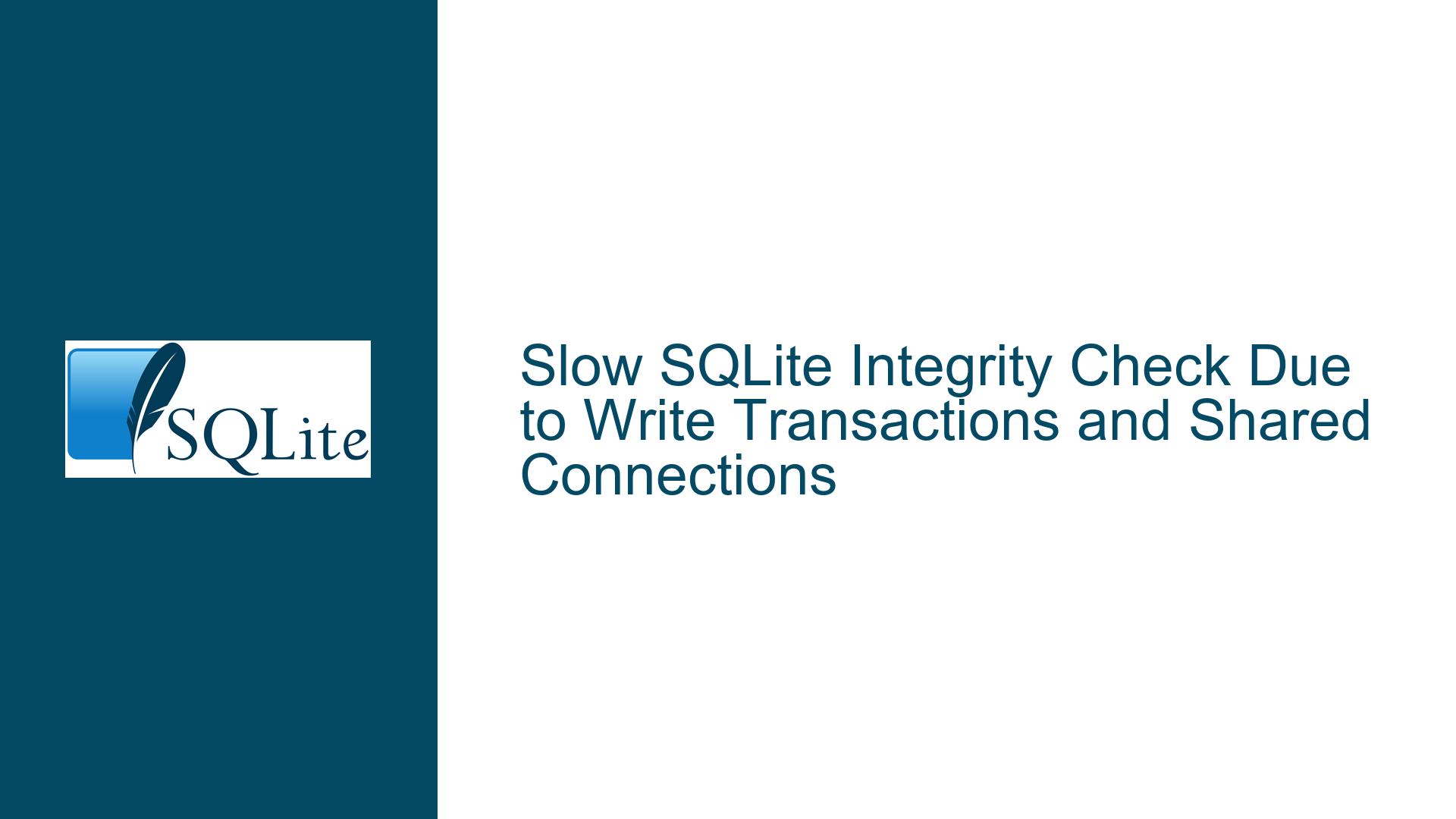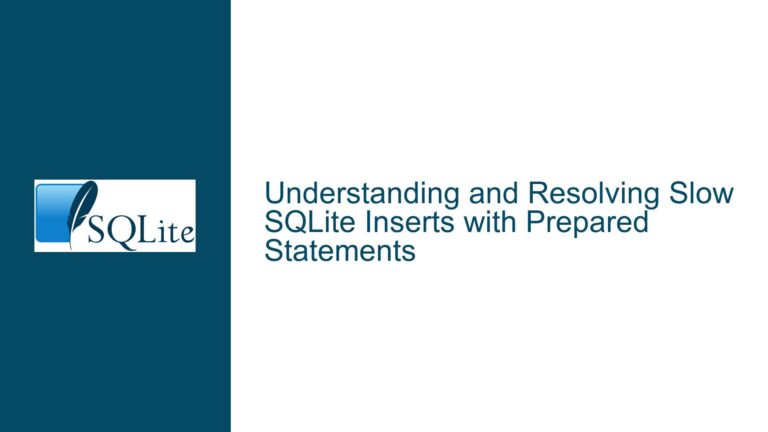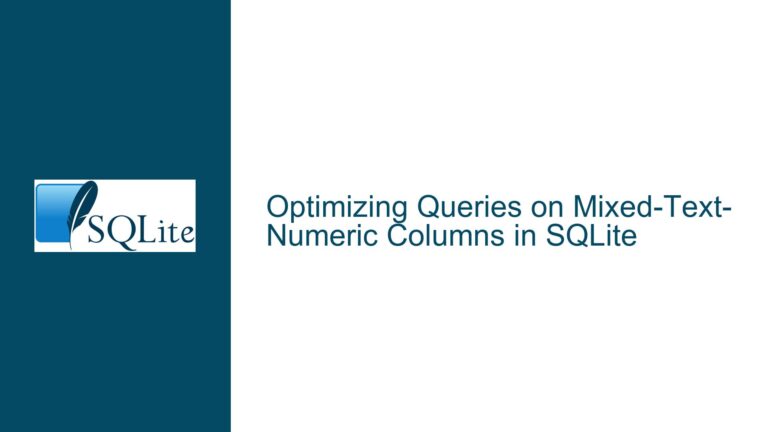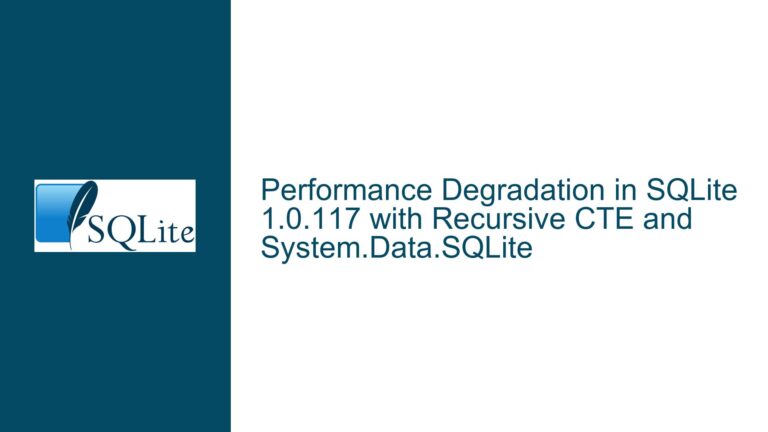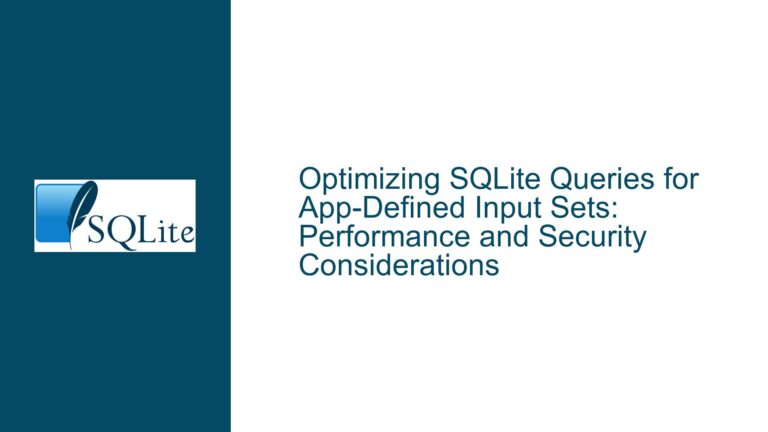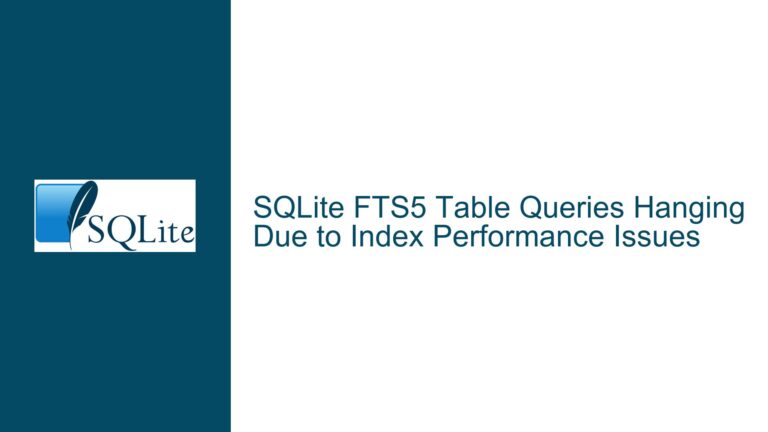Slow SQLite Integrity Check Due to Write Transactions and Shared Connections
Issue Overview: Delayed Integrity Check in SQLite WAL Mode
In SQLite, the integrity check is a critical operation that ensures the database is free from corruption. This operation is typically fast, especially for smaller databases, but under certain conditions, it can experience significant delays. In the described scenario, a database of approximately 7MB in size, operating in Write-Ahead Logging (WAL) mode, occasionally takes up to 30 seconds to complete an integrity check. This delay occurs despite no apparent issues with disk I/O or CPU utilization. The environment includes 10 read-only connections shared by 300 threads and a single read/write connection for write transactions. The integrity check is performed without acquiring a lock, allowing write transactions to proceed concurrently. The primary concern is identifying the factors that could cause such delays and determining whether concurrent write transactions could be a contributing factor.
The integrity check in SQLite is designed to verify the consistency of the database by examining the B-tree structures, free lists, and other internal data structures. When the database is in WAL mode, the integrity check must account for the WAL file, which contains uncommitted transactions that have not yet been applied to the main database file. This additional complexity can introduce delays, especially when write transactions are ongoing. The presence of multiple read-only connections further complicates the situation, as these connections may be accessing the database concurrently, potentially leading to contention for resources.
Possible Causes: Write Transactions and Shared Connections Impacting Integrity Check
The primary cause of the delayed integrity check in this scenario is likely related to the interaction between the integrity check operation and concurrent write transactions. In SQLite, write transactions in WAL mode involve modifications to both the main database file and the WAL file. When an integrity check is performed, it must ensure that it is examining a consistent snapshot of the database. This requires coordination with any ongoing write transactions to avoid reading inconsistent or partially applied changes.
The integrity check operation in SQLite acquires the per-connection mutex, which is held for the duration of the check. This mutex ensures that no other operations can interfere with the integrity check while it is in progress. However, if write transactions are ongoing, they may need to acquire the same mutex or other related locks, leading to contention. This contention can cause the integrity check to be delayed while it waits for the necessary locks to be released. The presence of 10 read-only connections shared by 300 threads further exacerbates the issue, as these connections may also be competing for the same resources.
Another potential cause of the delay is the size and complexity of the WAL file. In WAL mode, the WAL file contains a log of all uncommitted transactions. The integrity check must process this file to ensure that the database is consistent. If the WAL file is large or contains many uncommitted transactions, the integrity check may take longer to complete. Additionally, if the WAL file is being actively written to by concurrent write transactions, the integrity check may experience delays as it waits for the WAL file to stabilize.
The use of shared read-only connections can also contribute to the delay. These connections are shared by a large number of threads, which may be accessing the database concurrently. Each connection may hold locks or other resources that the integrity check needs to access, leading to contention and potential delays. Furthermore, the sheer number of threads sharing these connections can lead to increased context switching and resource contention, further slowing down the integrity check.
Troubleshooting Steps, Solutions & Fixes: Mitigating Delays in Integrity Check
To address the issue of delayed integrity checks in SQLite, several steps can be taken to mitigate the impact of concurrent write transactions and shared connections. The first step is to ensure that the integrity check is performed in a way that minimizes contention with other operations. One approach is to acquire an exclusive lock on the database before performing the integrity check. This lock would prevent any write transactions from occurring while the check is in progress, ensuring that the integrity check has exclusive access to the database. However, this approach may not be feasible in all scenarios, as it could lead to significant downtime for write operations.
Another approach is to schedule the integrity check during periods of low activity, when there are fewer write transactions occurring. This can help reduce the likelihood of contention and ensure that the integrity check completes more quickly. Additionally, it may be beneficial to reduce the number of read-only connections or the number of threads sharing these connections. By reducing the number of concurrent connections, the likelihood of contention for resources can be minimized, leading to faster integrity checks.
Optimizing the WAL file can also help reduce the time required for the integrity check. One way to do this is to periodically checkpoint the WAL file, which applies the changes in the WAL file to the main database file and truncates the WAL file. This can help keep the WAL file small and reduce the amount of work required during the integrity check. Additionally, ensuring that the WAL file is stored on a fast storage device can help improve performance.
Another potential solution is to use a separate connection for the integrity check, rather than sharing a connection with other operations. This can help reduce contention and ensure that the integrity check has exclusive access to the necessary resources. Additionally, it may be beneficial to increase the priority of the integrity check thread, ensuring that it is given preference over other threads when competing for resources.
Finally, it is important to monitor the performance of the integrity check and identify any patterns or trends that may indicate the cause of the delays. This can be done by logging the start and end times of the integrity check, as well as any relevant metrics such as the size of the WAL file, the number of concurrent connections, and the number of write transactions occurring during the check. By analyzing this data, it may be possible to identify specific factors that are contributing to the delays and take appropriate action to address them.
In conclusion, the delayed integrity check in SQLite is likely caused by contention between the integrity check operation and concurrent write transactions, as well as the use of shared read-only connections. By taking steps to minimize contention, optimize the WAL file, and monitor performance, it is possible to reduce the time required for the integrity check and ensure that the database remains consistent and free from corruption.
